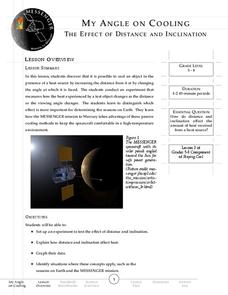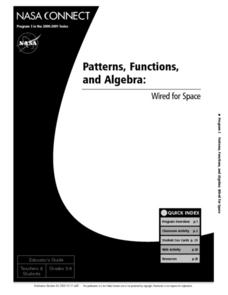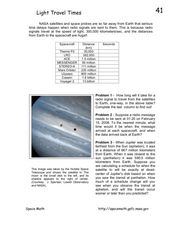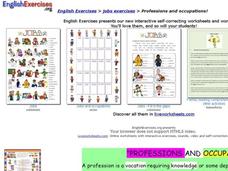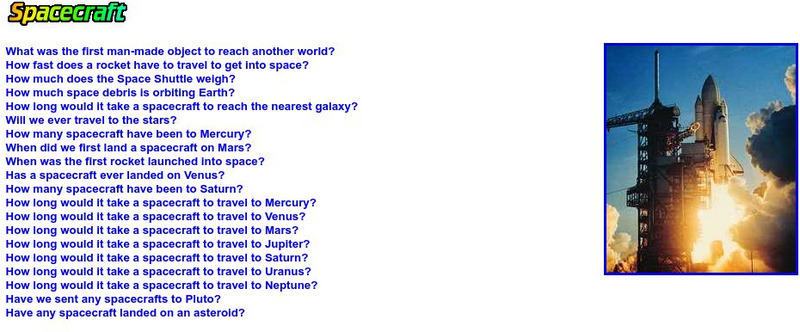Messenger Education
My Angle on Cooling—Effect of Distance and Inclination
When exploring Mars, spacecrafts are exposed to 5-11 times more sunlight than when near Earth. Groups of pupils complete a hands-on activity to explore how distance and angle of the sun affect temperature. Through discussions, they then...
International Technology Education Association
Tidy Up Those Sloppy Force Fields!
It is just magnetic. This resource presents the concept of Earth's and another planet's magnetic field and how spacecrafts detect them. Learners study a problem using magnetometers and participate in three experiments to come up with a...
Messenger Education
Give Me a Boost—How Gravity Assists Aid Space Exploration
The propellant needed for space explorations runs in the thousands, while paying to get the craft into orbit costs millions! In the second installment of three, two activities explore laws of conservation of energy and momentum. Using...
University of Colorado
Happy Landings: A Splash or a Splat?
Huygens spacecraft landed on Saturn's moon Titan in 2005, making it the farthest landing from Earth ever made by a spacecraft. In this hands-on activity, the 12th installment of 22, groups explore how density affects speed. To do this,...
Curated OER
Blast Off Into Space
Learners explore the vastness of the universe and identify terms used to describe solar systems. They take a tour of our sun and its neighbors and discover how spacecrafts can fly and then use their imaginations to draw and color a...
Curated OER
How Big is a Lunar Crater?
In this lunar crater activity, students use an image taken by the Lunar Orbiter spacecraft to find the scale of the image and determine the diameter of the lunar crater Tycho. They also find the size of the smallest and largest features...
Curated OER
Patterns, Functions, and Algebra: Wired for Space
Students assess how patterns, functions and algebra can assist NASA engineers design new ways of propelling spacecrafts. They explore how electricity and magnetism are replacing the fuel-consuming rocket propulsion. Electromagnetism is...
Curated OER
Exploring the Planets
Students study robotic spacecrafts that have provided detailed information about the inner and outer planets. In this exploring the planets lesson plan, students use posters and diagrams to study the various robotic spacecraft sent to...
Curated OER
Navigation and Trajectory
Students prepare a creative demonstration of how Earth and Mars revolve around the Sun. In this astronomy lesson, students determine the different challenges engineers face when building spacecrafts. They draw possible paths for a...
Curated OER
Light Travel Times
In this travel time of light worksheet, students read about the NASA satellites and space probes that transmit radio signals at the speed of light across huge distances. Students solve 3 problems about data transmission from space to...
Curated OER
The Relationship Between Science and Technology
Students study the role that technology has played in designing spacecrafts. In this science and technology lesson students view a video and complete a lab activity.
University of Colorado
The Jovian System: A Scale Model
Jupiter has 67 moons! As the seventh in a series of 22, the exercise shows learners the size and scale of Jupiter and its Galilean moons through a model. They then arrange the model to show how probes orbited and gathered data.
Teach Engineering
Red Rover Robotics
Help your class understand the importance of exploration using robots. with a resource that provides a short history of robotics as a lead into looking at Martian robotic exploration missions. The activity specifically looks at the...
Teach Engineering
The Great Gravity Escape
Groups simulate an orbit using a piece of string and a water balloon. Individuals spin in a circular path and calculate the balloon's velocity when the clothes pin can no longer hold onto the balloon.
University of Colorado
Spacecraft Speed
Space shuttles traveled around Earth at a speed of 17,500 miles per hour, way faster than trains, planes, or automobiles travel! In the 13th installment of 22, groups graph different speeds to show how quickly spacecraft move through...
Curated OER
Close Enough?
Middle schoolers examine how navigation is based on mathematics and how making a mistake in measuring an angle could have an impact on a target. They observe a teacher-led lecture, use a calculator to complete two worksheets, and...
Curated OER
The Dawn Mission: Ion Rockets and Spiral Orbits
In this ion rocket and orbits worksheet, students read about the spiral orbit the Dawn spacecraft took due to its ion rocket motor. Students solve 3 problems including finding the path taken by the spacecraft, determining the total path...
Curated OER
Hinode Satellite Power
In this Hinode satellite worksheet, students find the area of the solar panels that cover the Hinode satellite to provide power. They determine the amount of power produced by the solar cells and if it is enough to keep all the...
Curated OER
English Exercises: Jobs and Professions
In this ESL worksheet, students listen and watch a YouTube clip of an animated song about jobs. Students complete 100 exercises in an online quiz. Included are: matching jobs with pictures, a word search, and fill in the blank.
Curated OER
Space Exploration- Voyagers 1 and 2
Everyone loves to learn about outer space. This space exploration passage has 10 questions relating to Voyager 1 and 2. There are both comprehension and vocabulary questions. The activity could be used with upper elementary or ESL students.
Curated OER
Remote Sensing
Ninth graders participate in a variety of activities designed to reinforce the concept of light and the electromagnetic spectrum. They research and analyze data from remotely sensed images. They present their findings in a PowerPoint...
Curated OER
Solving Saturn's Mysteries
Young scholars study the Cassini spacecraft and its travel to Saturn. They discover the results of the space mission and examine images of Saturn that Cassini sent back.
Curated OER
Cold War - The Space Race
In these Cold War worksheets, students read about the space race between the United States and Russia. Students also read about the first man on the moon and answer 8 questions about the texts.
California Institute of Technology
Cool Cosmos: Ask an Astronomer for Kids! Spacecraft
Cool Cosmos makes it easy to learn more about spacecrafts through an easy to use list of kid's frequently asked questions. Just click on the question to enhance your understanding of this modern technological wonder.


